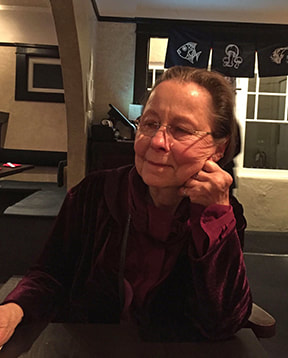When Voices Sang for Him
And then the voices
intertwined to sing for him,
father, who used to say a Russian funeral
will always break your heart.
I knew what he meant--
I’d heard the mournful melodies
and harmonies of grief,
the chants of graveside weeping,
the prayers for memory eternal.
I knew all that,
been to enough by then,
knew to stand grim
as smoke of incense drifted
upwards with the music,
the priests intoning ancient words,
the choir chanting in response.
But when I heard the voices
intertwine to sing those melodies for him
I felt the tears, so long held back, release at last
as smoke of incense drifted past.
And still I wondered if he heard the voices
twining in those melodies for him,
and what he felt and thought
because I could not comprehend
that he could not.
Her Voice
Just be grateful you can still hear her voice,
my friend remarked quietly
I’d been carrying on as I often did,
about my mother’s recurrent complaints,
her disappointment in the person I was,
—mainly not a replica of her.
She was well of voice then.
Then came the strokes.
The first merely frightened her.
The second took her control of words.
She left me phone messages anyway.
Write to me, her voice said.
and I knew it meant to call her.
Sometimes, she tried over and over
to say the word she knew she meant.
She’d compose her mouth and her brain,
but Sunday would come out as someday,
or church as birch, or tomato as potato.
Tfu! she would spit out after each failure.
The third stroke took away the word remnants
she’d managed to hold on to. She never accepted
the loss, protesting it with every gesture.
Lifting herself on her one good elbow,
she’d turn toward us, her face and half-body
poised in the manner of conversation, but the mouth and the tongue produced
only bu . . . bu . . . bu. . . .
She watched us trying to guess her message.
Her eyes spoke the humiliation.
There were no more phone messages.
I kept the last, garbled ones for a long time.
Now even those are gone, and her voice
is an absence I’ve come to know.
Born in Shanghai, China in 1939 to stateless Russian emigré parents, Marina Romani lived her first decade in Shanghai (including under Japanese occupation during WWII) before the family fled in 1949 during the Chinese Communist Revolution. Adventures as refugees in the Philippines and later Australia followed before her parents obtained passage and eventual citizenship to the United States, where they worked as Russian Language teachers at the Defense Language Institute in Monterey.
Growing up in Pacific Grove, Marina appeared a typical American teen of the 50’s, but always with a certain Russian flair. At the age of eighteen, she married fellow Russian emigre, Sasha Taurke, with whom she had her two children. Sasha was a career Military Intelligence Officer for the US Army, and for eighteen years she followed him around the world from Thailand to Texas and, finally, back to Pacific Grove. During those years Marina not only raised her children, but also found the time to earn a B.A. and a Masters degree in English Literature despite moving every two years. Though she eventually chafed as an army wife, her travels were a mind opener. Imagine living sequentially in Bangkok, Thailand, the West Point Military Academy, the university town of New Paltz, NY (during Sasha’s year in Vietnam) and Fort Hood, Texas, all during the fertile years of the 1960s and early 70’s.
After her divorce in 1976, Marina continued raising her children as a single mom while teaching ESL as well as Russian Translation and Interpretation at the Monterey Institute of International Studies (currently the Middlebury Institute). After her children grew up and left home, Marina moved to Los Angeles. Initially working as an Instructor in the Russian Language Department at USC, she ended her working career as a Senior Editor at the UCLA Center for 17th and 18th Century Studies. Upon her retirement in 2006, Marina returned to the Monterey Peninsula, enjoying and loving the natural beauty of the Central Coast as well as the closeness to her son and his family.
In those final fifteen years, Marina developed into a fine poet. She memorialized her Russian/Chinese childhood in a work of poetry and prose, Child Interwoven. A later work, Chiaroscuro Eye, contains more impressionistic encounters with friends and lovers. Both are available on Amazon. Additionally, her work was regularly published in local and regional journals including Homestead Review, Monterey Poetry Review, Poetry Pacific, and Porter Gulch Review.
She responded to the rocks and sea at Tor House in Carmel as well, volunteering as a tour guide for many years and maintaining community with the lovers of that place and of Robinson Jeffers, the poet who built Tor House with his own hands out of found rock.
She will be missed by friends and colleagues from her poetry circles and the Monterey Peninsula poetry community.

